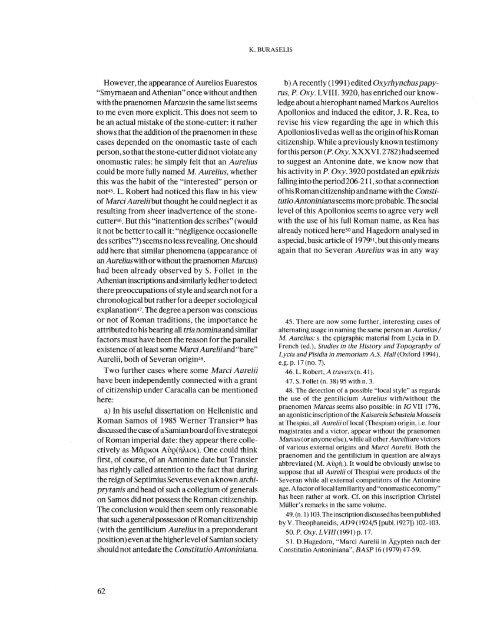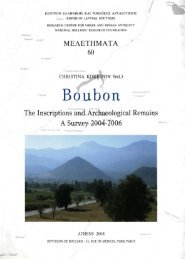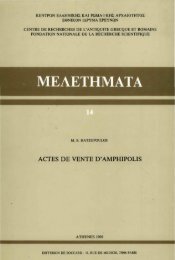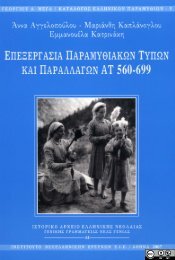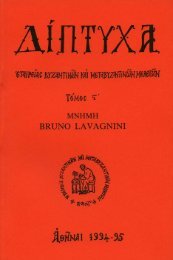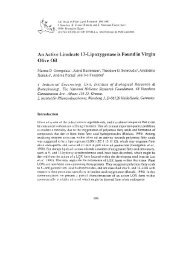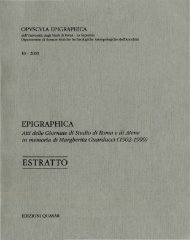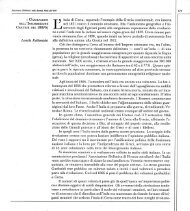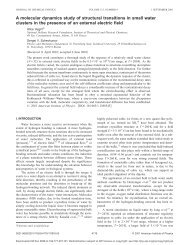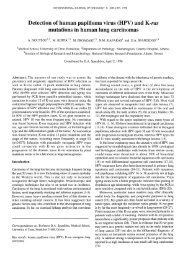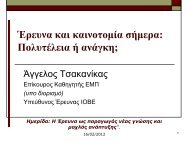Roman onomastics in the Greek East: social and political aspects ...
Roman onomastics in the Greek East: social and political aspects ...
Roman onomastics in the Greek East: social and political aspects ...
Create successful ePaper yourself
Turn your PDF publications into a flip-book with our unique Google optimized e-Paper software.
However, <strong>the</strong> appearance of Aurelios Euarestos<br />
"Smyrnaean <strong>and</strong> A<strong>the</strong>nian" once without <strong>and</strong> <strong>the</strong>n<br />
with <strong>the</strong> praenomen Marcus <strong>in</strong> <strong>the</strong> same list seems<br />
to me even more explicit. This does not seem to<br />
be an actual mistake of <strong>the</strong> stone-cutter: it ra<strong>the</strong>r<br />
shows that <strong>the</strong> addition of <strong>the</strong> praenomen <strong>in</strong> <strong>the</strong>se<br />
cases depended on <strong>the</strong> onomastic taste of each<br />
person, so that <strong>the</strong> stone-cutter did not violate any<br />
onomastic rules: he simply felt that an Aurelius<br />
could be more fully named M. Aurelius, whe<strong>the</strong>r<br />
this was <strong>the</strong> habit of <strong>the</strong> "<strong>in</strong>terested" person or<br />
not 45 . L. Robert had noticed this flaw <strong>in</strong> his view<br />
of Marci Aureliibut thought he could neglect it as<br />
result<strong>in</strong>g from sheer <strong>in</strong>advertence of <strong>the</strong> stonecutter<br />
46 . But this "<strong>in</strong>attention des scribes" (would<br />
it not be better to call it: "négligence occasionelle<br />
des scribes"?) seems no less reveal<strong>in</strong>g. One should<br />
add here that similar phenomena (appearance of<br />
an Aurelius with or without <strong>the</strong> praenomen Marcus)<br />
had been already observed by S. Follet <strong>in</strong> <strong>the</strong><br />
A<strong>the</strong>nian <strong>in</strong>scriptions <strong>and</strong> similarly led her to detect<br />
<strong>the</strong>re preoccupations of style <strong>and</strong> search not for a<br />
chronological but ra<strong>the</strong>r for a deeper sociological<br />
explanation 47 . The degree a person was conscious<br />
or not of <strong>Roman</strong> traditions, <strong>the</strong> importance he<br />
attributed to his bear<strong>in</strong>g all trìa nom<strong>in</strong>a <strong>and</strong> similar<br />
factors must have been <strong>the</strong> reason for <strong>the</strong> parallel<br />
existence of at least some MarcMure///' <strong>and</strong> "bare"<br />
Aurelii, both of Severan orig<strong>in</strong> 48 .<br />
Two fur<strong>the</strong>r cases where some Marci Aurelii<br />
have been <strong>in</strong>dependently connected with a grant<br />
of citizenship under Caracalla can be mentioned<br />
here:<br />
a) In his useful dissertation on Hellenistic <strong>and</strong><br />
<strong>Roman</strong> Samos of 1985 Werner Transier 49 has<br />
discussed <strong>the</strong> case of aSamian board of five strategoi<br />
of <strong>Roman</strong> imperial date: <strong>the</strong>y appear <strong>the</strong>re collectively<br />
as-Μάρκοι Αύρ(ήλιοι). One could th<strong>in</strong>k<br />
first, of course, of an Anton<strong>in</strong>e date but Transier<br />
hasrightly called attention to <strong>the</strong> fact that dur<strong>in</strong>g<br />
<strong>the</strong> reign of Septimius Severus even a known archiprytanis<br />
<strong>and</strong> head of such a collegium of generals<br />
on Samos did not possess <strong>the</strong> <strong>Roman</strong> citizenship.<br />
The conclusion would <strong>the</strong>n seem only reasonable<br />
that such ageneral possession of <strong>Roman</strong> citizenship<br />
(with <strong>the</strong> gentilicium Aurelius <strong>in</strong> a preponderant<br />
position) even at <strong>the</strong> higher level of Samian society<br />
should not antedate <strong>the</strong> ConstitutioAnton<strong>in</strong>iana.<br />
62<br />
Κ. BURASELIS<br />
b) A recently ( 1991 ) edited Oxyrhynchuspapyrus,<br />
P. Oxy. LVIII. 3920, has enriched our knowledge<br />
about ahierophant named Markos Aurelios<br />
Apollonios <strong>and</strong> <strong>in</strong>duced <strong>the</strong> editor, J. R. Rea, to<br />
revise his view regard<strong>in</strong>g <strong>the</strong> age <strong>in</strong> which this<br />
Apollonios lived as well as <strong>the</strong> orig<strong>in</strong> of his <strong>Roman</strong><br />
citizenship. While a previously known testimony<br />
forthis person (P. Oxy. XXXVI. 2782) had seemed<br />
to suggest an Anton<strong>in</strong>e date, we know now that<br />
his activity <strong>in</strong> P. Oxy. 3920 postdated an epikrisis<br />
fall<strong>in</strong>g <strong>in</strong>to <strong>the</strong> period 206-211, so that a connection<br />
of his <strong>Roman</strong> citizenship <strong>and</strong> name with <strong>the</strong> ConstitutioAnton<strong>in</strong>ianaseems<br />
more probable. The <strong>social</strong><br />
level of this Apollonios seems to agree very well<br />
with <strong>the</strong> use of his full <strong>Roman</strong> name, as Rea has<br />
already noticed here 50 <strong>and</strong> Hagedorn analysed <strong>in</strong><br />
a special, basic article of 1979 5 ', but this only means<br />
aga<strong>in</strong> that no Severan Aurelius was <strong>in</strong> any way<br />
45. There are now some fur<strong>the</strong>r, <strong>in</strong>terest<strong>in</strong>g cases of<br />
alternat<strong>in</strong>g usage <strong>in</strong> nam<strong>in</strong>g <strong>the</strong> same person an Aurelius/<br />
M. Aurelius: s. <strong>the</strong> epigraphic material from Lycia <strong>in</strong> D.<br />
French (ed.), Studies <strong>in</strong> <strong>the</strong> History <strong>and</strong> Topography of<br />
Lycia <strong>and</strong>Pisidia <strong>in</strong> memoriam A.S. Hall (Oxford 1994),<br />
e.g. p. 17 (no. 7).<br />
46. L. Robert, A travers (n. 41).<br />
47. S. Follet (η. 38) 95 with η. 3.<br />
48. The detection of a possible "local style" as regards<br />
<strong>the</strong> use of <strong>the</strong> gentilicium Aurelius with/without <strong>the</strong><br />
praenomen Marcus seems also possible: <strong>in</strong> IG VII 1776,<br />
an agonistic <strong>in</strong>scription of <strong>the</strong> Kaisareia Sebasteia Mouseia<br />
at Thespiai, all Aurelii of local (Thespian) orig<strong>in</strong>, i.e. four<br />
magistrates <strong>and</strong> a victor, appear without <strong>the</strong> praenomen<br />
Marcus (or anyone else), while all o<strong>the</strong>r Aurelii are victors<br />
of various external orig<strong>in</strong>s <strong>and</strong> Marci Aurelii. Both <strong>the</strong><br />
praenomen <strong>and</strong> <strong>the</strong> gentilicium <strong>in</strong> question are always<br />
abbreviated (Μ. Αύρή.). It would be obviously unwise to<br />
suppose that all Aurelii of Thespiai were products of <strong>the</strong><br />
Severan while all external competitors of <strong>the</strong> Anton<strong>in</strong>e<br />
age. A factor of local familiarity <strong>and</strong> "onomastic economy"<br />
has been ra<strong>the</strong>r at work. Cf. on this <strong>in</strong>scription Christel<br />
MUller's remarks <strong>in</strong> <strong>the</strong> same volume.<br />
49. (n. 1) 103. The <strong>in</strong>scription discussed has been published<br />
by V.Theophaneidis, AD9 (1924/5 [publ.1927]) 102-103.<br />
50. P. Oxy. LVIII(\99\)p. 17.<br />
51. D.Hagedorn, "Marci Aurelii <strong>in</strong> Ägypten nach der<br />
Constitutio Anton<strong>in</strong>iana", BASP16 (1979) 47-59.


